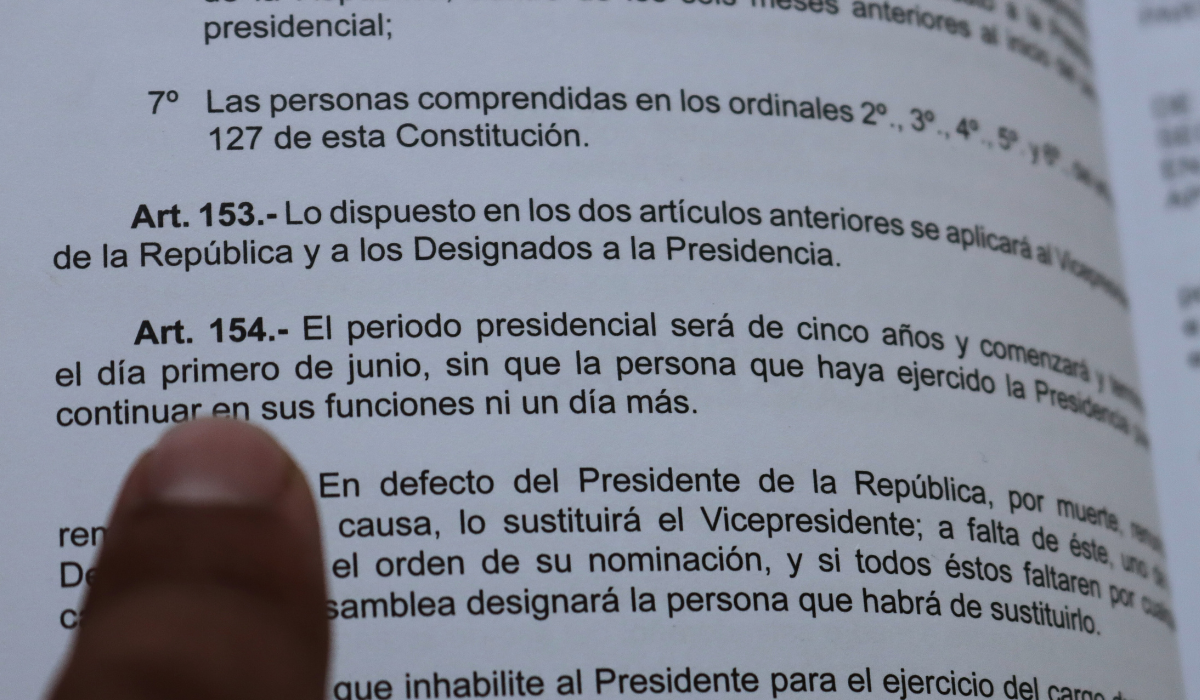In El Salvador, immediate presidential reelection does not exist. Florentín Meléndez, technical director of the Rights and Dignity Project of Counterpart International, stated this, which USAID is funding.
“That is as clear as drinking water,” said the expert. The specialist recalled that the Constitutional Chamber of Honduras made an interpretation in which it endorsed reelection, as has happened in El Salvador. However, Meléndez emphasized that the prohibition of a consecutive second presidential term “is not up for discussion” in both countries.
This, according to Meléndez, is because the Magna Carta of both countries has the same provisions in which the alternation of power is guaranteed, that one cannot remain a day longer after the end of the term, that the Assembly must disregard it if it continues in power, among others.
The expert highlighted that in El Salvador, there are two additional aggravating factors to this illegal action.
The former magistrate of the Constitutional Chamber asked who are the ones carrying out direct acts for reelection and whether they will lose their citizenship rights as established by law. He mentioned the candidate who registers, the board of directors of the party, and the magistrates of the TSE that register him.
Meléndez stressed that the supremacy of the Constitution of the Republic, the separation of powers, and respect for due process are just some of the characteristics that ensure the functioning of a state of law.
The specialist told students from Honduras, Guatemala, and El Salvador that the constitutions of the three countries have some gaps, as they do not include sections that speak about the rights of victims, women, the human right to water and others.
Meléndez said this while analyzing the constitutive elements of a state of law at the opening of the Interuniversity Week on the Rule of Law and Access to Justice promoted by the Project Strengthening the Rule of Law in the Northern Triangle of Central America implemented by the German Agency for International Cooperation GIZ.
La prohibición de un segundo mandato presidencial continuo “no tiene discusión”: exmagistrado de la CSJ
En El Salvador no existe la reelección presidencial inmediata. Así lo afirmó Florentín Meléndez, director técnico del Proyecto Derechos y Dignidad, de Counterpart International, que está siendo financiado por USAID.
“Eso es clarísimo como el agua potable”, dijo el experto. El especialista recordó que la Sala Constitucional de Honduras hizo una interpretación en la cual avaló la reelección, al igual que ha sucedido en El Salvador. Sin embargo, Meléndez remarcó que la prohibición de un segundo mandato presidencial continuo “no tiene discusión”, en las dos naciones.
Esto, según Meléndez, debido a que la Carta Magna de los dos países tiene las mismas disposiciones en las que se garantiza la alternancia en el poder, que no se puede permanecer un día más de finalizar el periodo, que la Asamblea lo debe desconocer si continúa en el poder, entre otras.
El experto subrayó que en El Salvador se le añade dos agravantes a esta acción ilegal.
El exmagistrado de la Sala de lo Constitucional preguntó quiénes son los que realizan actos directos para la reelección y si estos perderán sus derechos de ciudadanos como lo establece la ley. Mencionó al candidato que se inscribe, la junta directiva del partido y a los magistrados del TSE que lo inscriben.
Meléndez recalcó que la supremacía de la Constitución de la República, la separación de poderes, el respeto al debido proceso son solo algunas de las características que aseguran el funcionamiento de un Estado de derecho.
El especialista dijo a estudiantes de Honduras, Guatemala y El Salvador que las constituciones de los tres países tienen algunos vacíos, pues no incluyen apartados que hablen sobre derechos de las víctimas, de las mujeres, así como del derecho humano al agua y otros.
Meléndez dijo esto al analizar los elementos constitutivos de un Estado de Derecho en la inauguración de la Semana Interuniversitaria sobre Estado de Derecho y Acceso a la Justicia impulsada por el Proyecto Fortalecimiento del Estado de Derecho en el Triángulo Norte de América Central implementado por la Agencia Alemana de Cooperación Internacional GIZ.

